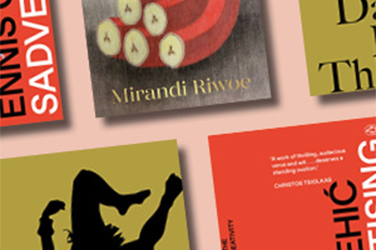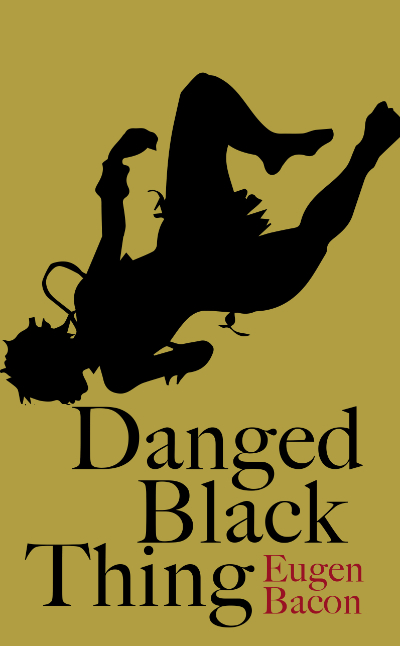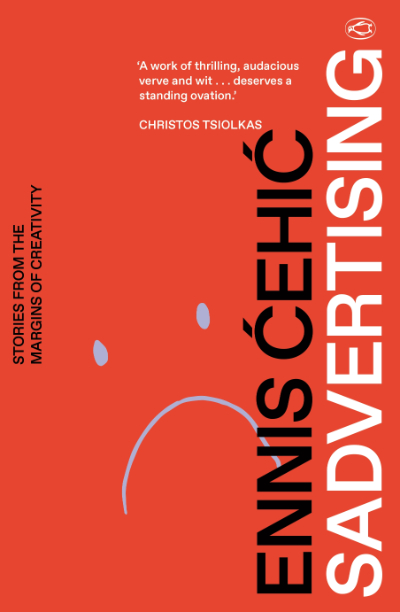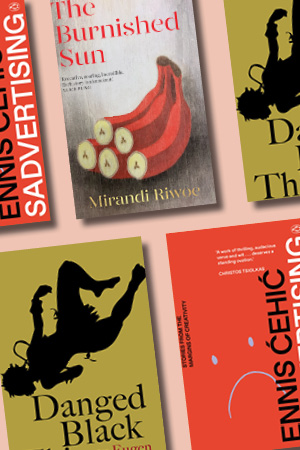- Free Article: No
- Contents Category: Short Stories
- Custom Article Title: Three powerful new short story collections
- Review Article: Yes
- Article Title: Restless invention
- Article Subtitle: Three powerful new short story collections
- Online Only: No
- Custom Highlight Text:
The Burnished Sun (UQP, $29.99 pb, 288 pp) by Mirandi Riwoe, Danged Black Thing (Transit Lounge, $29.99 pb, 240 pp) by Eugen Bacon, and Sadvertising (Vintage, $32.99 pb, 298 pp) by Ennis Ćehić are powerful, inventive, and self-assured short story collections that traverse fractured and contested ground through their often displaced and alienated narrators.
- Featured Image (400px * 250px):

- Alt Tag (Featured Image): Cassandra Atherton reviews 'The Burnished Sun' by Mirandi Riwoe, 'Danged Black Thing' by Eugen Bacon, and 'Sadvertising' by Ennis Ćehić
The opening novella, Annah the Javanese, is told from the point of view of Gauguin’s model and lover. Much more than giving Annah a voice, Riwoe disrupts and rewrites the Gauguin archives. She argues that this challenge to archival authority uncovers that fact that ‘everything we know about [Annah] is from a middle and [upper] class … white background’. She unsettles Gauguin’s dominance by pointedly emphasising Annah’s pronunciation of ‘Paul’ as ‘Pol’ and, in the rich and cerebral inner life she creates for Annah, exposes her exoticisation, sexualisation and fetishization: ‘Dread lies cold and heavy in her stomach. She pictures herself trailing after him, as she did before, like the black servant in that painting of Olympia, or the dark man who waits upon the handsome woman in the magazine.’
The novella Fish Girl, shortlisted for the 2018 Stella Prize, takes a similar approach as Riwoe writes back to Somerset Maugham’s story ‘The Four Dutchman’ from the point of view of an Indonesian girl, Mina. The horror of Mina’s situation – set in four parts, each beginning with an epigraph drawn from Maugham’s short story – is graphic and haunting: ‘It’s pitiful how weak she is compared with the two men. She flaps on the deck like a fish. When she hears Haas call her a Malay trollop, her chest fills with so much hatred she’s sure the power of it will help her break free of her restraints.’
Between these two powerful novellas, there are ten short stories that explore iterations of these themes in the present day, demonstrating Riwoe’s deftness as a writer of both historical and contemporary fictions. These include: ‘Hardflip’, which highlights racism in the skateboarding fraternity; ‘Dignity’, where Riwoe provides a confronting depiction of underprivileged women working abroad in often brutal conditions in order to send money to their families; ‘Growth’, about a ‘fetus in fetu’; and ‘What would Kim Do?’, where the influence of celebrity sex and porn on young people is explored through a vivacious character, Milly. Finally, ‘Hazel’, perhaps the most potent and stirring story in the collection, is set in aged care during the Covid lockdowns, with a grandmother trying to communicate with her family through a large window. Riwoe’s masterful emphasis on the silence, fissures in time, and deep loneliness for older Australians in aged care and their families is heart-wrenching.
 Danged Black Thing by Eugen Bacon
Danged Black Thing by Eugen Bacon
Transit Lounge, $29.99 pb, 240 pp
Eugen Bacon’s Danged Black Thing is a thrilling, genre-defying collection of short stories that draws on elements of urban fantasy, neo-surrealism, speculative fiction, science fiction, mythology, and poetic prose. Her stories unfold across many different continents and temporalities in pithy expressions of the Nietzschean philosophy of eternal recurrence. Bacon uses hybridity to dismantle boundaries and position identity as fractured and fluent.
‘Simbiyu and the Nameless’ tracks the dark misfortunes of the eponymous protagonist from the age of eighteen months to twenty-three years. The use of the second-person pronoun is particularly confronting as Bacon describes a ‘lurching darkness assembling, disassembling. A menace approaching, human, nonhuman, waving tentacles’ that is inescapable. Similarly, in ‘A Pod of Mermaids’, Angerboda is being shadowed by Loki as she attempts to mother a series of earthling boys. Believing her only solution is to ‘hide the gleaming’ from him, she pours this shining part of herself into the shell of one of her sons. The repetition of the mother’s lamentations in this short story is underscored by Bacon’s use of anaphora: ‘Grief was missing a view of a crystal lake, not hearing hummingbirds breathing at dawn … Grief was the same question inside every border of a cupboard, and she was sitting knees up in its dusk. Grief was missing things that contradicted their truth.’
Bacon’s stories about the global climate crisis are some of the most striking and confronting in the collection. In ‘The Water Runner’, set in a dystopian and futuristic Tanzania, ‘a perpetual drought’ means that Zawadi ‘collects water from dead people’. This is taken to neo-gothic extremes in ‘When the Water Stops’, when humans turn to vampirism to survive. Water is also used as a conceit in ‘Rain Doesn’t Fall on One Roof’, where Bapoto ‘a migrant alone in this world, far from her clan’, tries to find work to support her young son. Her exhaustion and resilience are conveyed in bright bursts of intimacy with her son. While all the stories in this collection are remarkable narratives, those co-authored with Andrew Hook, Seb Doubinsky, and E. Don Harpe shift the scope of Bacon’s preoccupations and lose some of the lyricism and ambiguity that make her sole-authored stories unique.
 Sadvertising by Ennis Ćehić
Sadvertising by Ennis Ćehić
Vintage, $32.99 pb, 298 pp
Ennis Ćehić’s Sadvertising is an ingeniously self-reflexive and neo-surrealist collection of very short stories and micro-literature. In taut and often biting narratives, Ćehić brings unexpected perspectives to the idea of advertising as powerfully manipulative. This begins with the hilarious ‘Poeticules’: ‘On Wednesday, they announced they were all poets. They’d had enough of being called copywriters … Advertising needed to be taken seriously; it was the poetry of consumer goods.’ It continues in the witty and pointed ‘Consummatum Est’, where two strategists, offended by the word ‘consumer’, change every document in which it appears to ‘human’.
Ćehić’s critique of capitalism in the neoliberal era is often expressed in moments of black humour. Some of the most memorable stories, which draw on (what the reader is encouraged to believe is) the author’s real life experience in the advertising industry include: ‘NMBA’ or ‘No More Bad Advertising’, where Kendall Jenner worries that no one will respect her after doing a Pepsi advertisement that is ‘the greatest failure in advertising history’; ‘Meetings’, where Jo opines about the meaninglessness of meetings; ‘The Final Frontier’, where Cameron momentarily fools himself into believing he has ‘the best idea’; a logo on a T-shirt in ‘Brand of Living’ that anthropomorphically pushes out of its clothing and runs away; ‘Modern Feed’ where newsfeed is food for life; ‘Gorilla 2.0’, where Tom’s melancholic idea for a Cadbury advertisement affects the frenzied population; and ‘Nympholept’, where Harry feeds Renata Baileys Chocolate Truffles on an extraordinary moss bed. While the stories in this collection utilise engaging hooks, many of the conclusions are a little strained or shut down possibilities for further ludic moments.
The centrepiece of the book is the three-part story ‘Meta Ennis’. These are fascinating pieces of metaliterature that ruminate on what happens to the artist in advertising. Significantly, in part three, Ennis (who appears self-reflexively) tells himself, ‘you don’t matter in this book’ and as his ‘mouth utter[s] … Move on’, he dismisses rather than kills the author.
These three collections exemplify how contemporary Australian fiction writers continue to challenge conventional mores and are restlessly inventive in their approaches to narrative. Each writer, in different ways, asks readers to step into richly imagined worlds where what we may believe we know is challenged, reconstructed, or subverted, sometimes strangely, sometimes in deeply salutary ways.



Comments powered by CComment